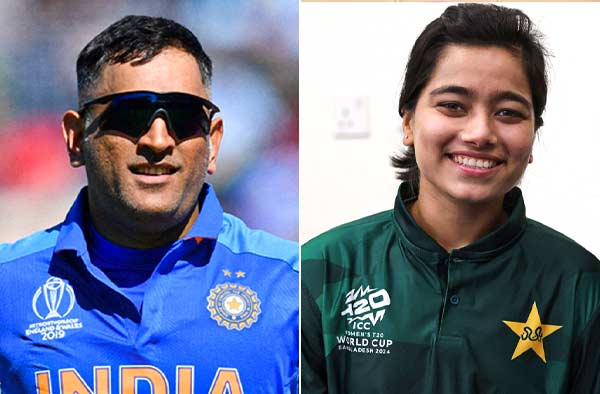As Pakistan gears up for the ICC Women’s ODI World Cup, their young captain Fatima Sana is preparing for the biggest challenge of her career. Rooted in resilience and inspired by cricketing greats, the Pakistan captain aims to lead her side into a new era of belief and competitiveness.

The tournament begins on September 30, jointly hosted by India and Sri Lanka. Under an arrangement between the Board of Control for Cricket in India (BCCI) and Pakistan Cricket Board (PCB), Pakistan will play all their matches in Sri Lanka, starting with Bangladesh in Colombo on October 2.
Taking charge of a national team at a global event comes with inevitable nerves, and Fatima admits to feeling the weight of responsibility. But she has turned to one of cricket’s most admired leaders for guidance.
She has studied the way Dhoni handles pressure and steers matches with poise. “It is natural to be a little nervous initially when captaining in a big tournament like the World Cup, but I take inspiration from Mahendra Singh Dhoni as a captain,” she said.
“When I got the captaincy, I thought that I have to become like Dhoni. I also watched his interviews and got to learn a lot,” she added.
Pakistan have featured in five Women’s ODI World Cups (1997, 2009, 2013, 2017 and 2022). But they struggled for wins in three of those campaigns (1997, 2013 and 2017). Their most recent appearance in 2022 yielded just a single victory, against the West Indies in Hamilton, leaving them at the bottom of the table.
Fatima, however, is convinced that things will be different this time. “This time, the jinx will definitely be broken because the young players know how important this tournament is for Pakistan women’s cricket. We will not think about the past. My goal is to take the team to the semifinals,” she declared.
As an all-rounder herself, Fatima values balance in the squad but believes the bowling unit will set the tone for Pakistan.
“We have top-class bowlers in the team and spinners will be our trump card. We will depend more on bowling than batting but in the last one year, we have worked a lot on batting, and we will get results,” she said.
The team has been together since the qualifiers in April, which they finished unbeaten having won all the five matches. Their rhythm, according to Fatima, remains intact.
“The team is in good rhythm and after the good performance in the qualifiers, everyone’s morale is high. More or less the same players are in the team who played in the qualifiers. This is the first World Cup for six players, and they are very excited,” she noted.
Pakistan’s immediate build-up includes a three-match ODI series against South Africa in Lahore, which Fatima views as crucial for testing combinations.
“We had played matches among ourselves in domestic cricket. Before the tournament, we will play a series with South Africa in which we will try to prepare the team combination. We would like the players to play naturally without the pressure of the World Cup,” she explained.
While Pakistan’s focus is inward, Fatima has been watching other teams. “My favourite team is Australia. It is difficult to predict the semifinalists, but India’s performance has been very good in the last few years. They have very experienced players like Jemimah (Rodrigues), Smriti (Mandhana) and Harmanpreet (Kaur) but we will not focus on any one player,” she said.
On India’s prospects as hosts, she acknowledged both the advantage and the challenge, “India has never won the World Cup and being the host, there will be pressure to win. But along with this, the presence of home fans also boosts morale. It depends on the team how it takes it.”
Fatima’s rise in cricket began on the streets of Karachi, playing with her brothers at the age of 11. Today, she stands as the national captain with 397 runs and 45 wickets in 34 ODIs to her name. Off the field, her resilience has been tested. During the T20 World Cup last year, she lost her father but chose to continue playing, driven by his dream.
“My father dreamed of watching me play in the World Cup. I went back to play to fulfil his wish. I knew that Virat also did the same,” she said, recalling how Kohli too once returned to the field the day after his father’s passing. The memory of Sachin Tendulkar in the 1999 World Cup also resonates with her, further reinforcing her belief that cricket is as much about mental strength as skill.
As she prepares for her first ODI World Cup as leader, Fatima blends Dhoni’s composure with Perry’s inspiration. She hopes Pakistan’s young unit will not only upset predictions but also inspire lasting respect for the women’s game in her homeland.
With calmness at the heart of her leadership philosophy, she is determined to turn Pakistan’s story in women’s cricket from one of struggle into one of belief and progress.
(Quotes sourced from PTI)
